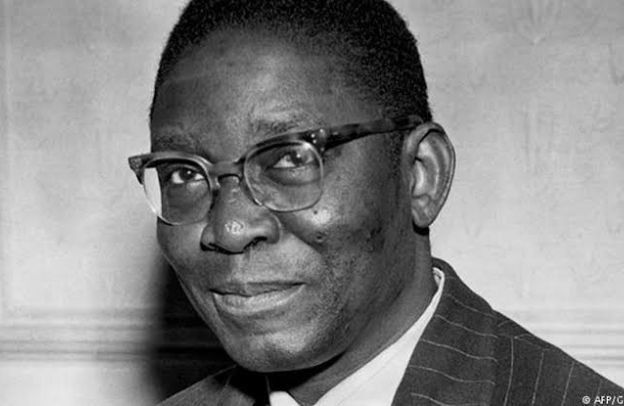Dr. Nnamdi Azikiwe, The First President Of Nigeria – 1963 To 1966

Dr. Nnamdi Azikiwe was a visionary leader, a passionate advocate for African independence, and the first President of Nigeria. He was a true pillar of hope and a symbol of the aspirations of a nation seeking freedom from colonial rule. Today, we intend to delve into the remarkable life of Dr. Nnamdi Azikiwe, highlighting his key accomplishments and emphasizing why he should be remembered as a true hero in Nigerian and African history.
Want to learn more about the power of storytelling? Download the first chapter of Our Storytelling Series: Beginners’ Guide for Small Businesses & Content Creators by Obehi Ewanfoh.
Early Life and Education
The child that would later be known as Dr. Nnamdi Azikiwe was born on November 16, 1904, in Zungeru, Niger State of Northern Nigeria. For 14 years, from 1902 until 1916, Zungeru was the capital of the British protectorate of Northern Nigeria, and it was also the place where the name, Nigerian was said to have been first proclaimed by Fredrick Lugard. 1904 was obviously a time when most of Africa was witnessing the oppressive grip of European colonialism.
Looking at his name, Azikiwe an Igbo name, which signifies “my father is alive”, you can almost wonder how he got to be born in northern Nigeria which is predominantly Hausa/Fulani people. Well, there is an explanation. His father, Obed-Edom Chukwuemeka Azikiwe (1879-1958), originated from Onitsha and he served as a clerk in the British Administration of Nigeria, which required him to travel extensively. That was how the Azikiwe family got to northern Nigeria.
From an early age, Azikiwe, popularly known as Zik demonstrated remarkable intellectual acumen and an unwavering commitment to education and learning.
His educational journey took him through a multitude of primary and secondary mission schools situated in Onitsha, Calabar, and Lagos. In 1925, he embarked on a transformative chapter of his life when he arrived in the United States, immersing himself in various academic institutions.
Azikiwe’s relentless pursuit of knowledge and intellectual growth bore fruit as he obtained numerous certificates and degrees, including a bachelor’s and master’s degree from Lincoln University in Pennsylvania. Additionally, he further expanded his academic achievements by attaining a second master’s degree from the esteemed University of Pennsylvania.
In 1935, Azikiwe ventured to the Gold Coast, now Ghana, where he played a pioneering role in igniting the flames of nationalism. The following is a quote from an online group which I think is called “USA African Dialogue Series”:
“By 1935 when Azikiwe returned to Africa and settled in the Gold Coast, Francis Kwame Nkrumah was still in a Catholic Seminary studying to be a priest. It was through Azikiwe’s activist journalism and his address to the Ghana Teachers Union that Nkrumah first met Zik, who began to mentor him, and in fact convinced him to seek further education in the US. He gave him introductory and recommendation letters to his old school in Lincoln into which Nkrumah was enrolled with other men who had been inspired by Zik”. End of quote.
It was during this time that Azikiwe established a nationalist newspaper, becoming not only a prominent figure but also a mentor to Kwame Nkrumah, who would later become the first president of Ghana. After a period of impactful engagement in the Gold Coast, Azikiwe returned to his beloved homeland, Nigeria, in 1937. Fueled by his experiences abroad and armed with a burning desire for change, he took on multiple roles within the country.
In Nigeria, Azikiwe’s passion for the dissemination of information and the power of the written word led him to find and oversee different newspapers that served as influential platforms for societal dialogue. Simultaneously, he ventured into the realm of politics, first aligning himself with the Nigerian Youth Movement and later, in 1944, co-founding the National Council of Nigeria and the Cameroons (NCNC).
The NCNC, with its growing identification with the Igbo people of southern Nigeria, became a significant force in the pursuit of Nigerian independence.
The year 1948 marked a significant milestone for Azikiwe as, with the support and backing of the NCNC, he secured a position in the Nigerian Legislative Council. This achievement solidified his influence and positioned him as a key figure in Nigerian politics. Subsequently, he went on to serve as the premier of the Eastern region from 1954 to 1959, further cementing his role as a leader who was dedicated to the advancement and welfare of his people.
Championing Pan-Africanism
Nnamdi Azikiwe’s legacy is one of intellectual prowess, tireless activism, and unwavering commitment to Nigeria’s progress. Remember that by this time, most African countries were still under the dominion of European colonialism or if you like, enslaved people in their own land. So, the fire for freedom was burning in the heart of many Africans, particularly those who had had the chance to travel aboard and saw the European hypocrisy or the sharp difference between what the European colonialists were practicing in Africa and what they were living in their own countries.
Returning to Nigeria with an enlightened perspective, Azikiwe became a tireless advocate for Pan-Africanism, firmly believing in the unification of the African continent. Through his newspaper, the West African Pilot, he fearlessly voiced the concerns and aspirations of Nigerians and Africans, becoming a prominent voice for independence and self-determination.
His journey from humble beginnings to becoming a catalyst in education, journalism, and politics serves as an enduring testament to the power of education and the indomitable spirit of an individual who is dedicated to effecting change. Sure, the people who believe in change and have a good level of initiative always find a way to make change happen, and they do this by leveraging everything within their possibilities.
This is what you see in the life of Azikiwe. His charisma, oratory skills, and his ability to inspire the masses were unparalleled, and he soon became a beacon of hope for millions across Nigeria. As the face of Nigerian nationalism, Azikiwe worked tirelessly to unite diverse ethnic groups and forge a national identity, rooted in shared values and aspirations.
The Path to Independence
Zik cleverly navigated the complexities of Nigerian politics and played a vital role in negotiating the country’s independence from British colonial rule, which was achieved on October 1, 1960.
“The people of Nigeria cannot continue to accept as their destiny the denial of human rights. We, too, have a right to live, to enjoy freedom, and to pursue happiness like other human beings.” That is a clip from Dr. Azikwe, speaking in 1949 at a rally for Nigerian Independence at Trafalgar Square, London.
Azikiwe’s unwavering dedication to the cause of liberation, his diplomacy, and his wise leadership were instrumental in laying the foundation for a new era in Nigerian history.
He led the NCNC with firm determination into the consequential federal elections of 1959, a pivotal juncture preceding Nigeria’s long-awaited independence. Through strategic alliances, he succeeded in establishing a provisional government alongside the influential Northern People’s Congress.
However, it was Abubakar Tafawa Balewa, the deputy leader of the Northern People’s Congress, who assumed the significant role of prime minister. Azikiwe, in turn, assumed largely ceremonial positions as president of the Senate, governor-general, and eventually, president.
Becoming the First President of Nigeria
With independence came the birth of a new nation, and in 1963, Nnamdi Azikiwe was inaugurated as the first President of Nigeria. As President, he advocated for unity, social justice, and the eradication of poverty.
“After years of agitation for nationhood,” said a New York time article, “Dr. Azikiwe became Governor General of the Nigerian Federation at independence from Britain in 1960, and President in 1963, when the country was declared a republic.”
In office, he established institutions to promote education, economic growth, and cultural preservation, recognizing that a prosperous and inclusive society could only be built through the empowerment of its citizens.
Nnamdi Azikiwe was extremely knowledgeable about politics, communication, and journalism and he knew what he was talking about as a political actor. Apart from building up a strong political opinion of the kind of leadership he wanted, he was also able to influence other African leaders.
In Ghana, as already stated, he was a mentor to Kwame Nkrumah, and according to the New York Times article earlier cited, “Dr. Azikiwe taught political science at Lincoln University for three years in the early 1930’s before returning to Africa, where he founded the first of five newspapers he would create, The African Morning Post, in Accra, Ghana, in 1934.”
Dr. Azikwe was certainly an ambitious leader, he wanted Nigeria to play an exemplary leadership role in Africa, and he was not afraid to drag most of the movers and shakers in Africa and among the African diaspora into his leadership philosophy. That was how he got Martin Luther King Jr. to his inauguration in Lagos, in 1963.
Inviting Martin Luther King Jr. to his inauguration
On the website of Stratford University, there is a letter from Dr. Nnamdi Azikiwe, dated October 26, 1960. The letter was addressed to Martin Luther King, Jr, inviting him to attend his inauguration as the governor-general and commander-in-chief of Nigeria on 16 November 1960. Here is the letter and it reads:
“My dear Reverend King:
This is to inform you that I have included your name in the list of invitees to attend my inauguration on November 16, 1960, when I will be sworn in as Governor-General and Commander-in-Chief of the Federation of Nigeria.
The occasion will be of historic interest because it will be the first time in our national history when a person of African descent will be assuming the high office of Head of State in Nigeria, as representative of Her Majesty the Queen, Head of the Commonwealth.
I hope that when the official invitation reaches you, you will be disposed to accept same. I am looking forward to an early reunion with you.
With kind wishes.
Sincerely yours,
[signed]
Nnamdi Azikiwe.
As of the time of this recording, I did not get a letter of direct reply from Martin Luther King Jr. However, I got another letter and this time by Dr. King, and it was addressed to Kwame Nkrumah, the first president of Ghana and it reads:
“Dear Dr. Nkrumah:
I have been intending to write you ever since I left Ghana in 1957 after having a most rewarding experience at your independence celebration. Words are inadequate for me to express my appreciation to you for the hospitality that you extended to me and my wife…”
Going forward towards the end of the letter, Dr. King added: “I certainly hope that our paths will cross again in the not-too-distant future. If I come to Nigeria next year for the independence celebration, I will certainly plan to stop by Ghana.
Very sincerely yours,
Martin Luther King, Jr.”
Yes, Dr. King did honor and participated in the inauguration of Nnamdi Azikiwe as governor-general and commander-in-chief of Nigeria, on 16 November 1960. And that is a testament to his caliber of person and the people he wanted to associate with.
But everything was not always rosy for Nnamdi Azikiwe as a political leader and public figure in Nigeria. The saying that “uneasy lies the head that wears a crown” would be true in his case and on multiple occasions. One such occasion was during the Nigerian-Biafran war, a few years after independence from Britain.
Nnamdi Azikiwe and the Nigerian civil war
During the Nigerian-Biafran conflict that spanned from the 6th of July 1967 to the 15th of January 1970, Azikiwe initially lent his support to his fellow Igbo brethren. Displaying unwavering commitment, he embarked on extensive travels in 1968, advocating for the recognition of Biafra and seeking assistance from other African nations.
In an article, Nnamdi Azikiwe and The Nigerian Civil War, on Independent, it was reported, and I quote, “One incontrovertible evidence of Zik’s support for the rebels remains the winning of diplomatic recognition for Biafra. Zik made a grand tour of Africa, visiting such countries as Ivory Coast, Tanzania, and Zambia just before recognition was accorded.”
And here it can be very tricky, and I want to believe you understand what I mean. For a man who has been advocating for Pan-Africanism, mentoring such an important figure as Kwame Nkrumah and his wealth of exposure overseas to start promoting a secessionist agenda was quite complicated, to say the least. Well, that is the nature of politics. Sometimes, it’s far deeper than it usually appears on the surface and most political literature is full of such instances.
However, as the war progressed and the realization of its futility set in, Azikiwe made an important decision in 1969. Understanding the dire circumstances surrounding the war, he shifted his allegiance to support the federal government. And that one decision would remain a mixed feeling among many Igbo people of Nigeria to date.
Following Olusegun Obasanjo’s transition of power to civilian rule in 1979, Azikiwe pursued the presidency as the candidate of the newly formed Nigerian People’s Party (NPP). However, his aspirations were met with disappointment as he faced defeat in the presidential race.
In the lead-up to the 1983 elections, the NPP became part of an informal coalition of opposition parties known as the Progressive Parties Alliance (PPA). The coalition, although fragile in nature, was aimed to challenge the ruling party. Nonetheless, internal divisions prevented consensus on a single presidential candidate, resulting in the fielding of two contenders: Azikiwe representing the NPP and Obafemi Awolowo representing the Unity Party of Nigeria (UPN).
Azikiwe and Awolowo, longstanding political rivals often in disagreement, vied for the presidency within the framework of the strained coalition. By the time the election arrived, the coalition had significantly deteriorated, lacking the necessary cohesion. Consequently, neither Azikiwe nor Awolowo emerged victorious, marking a disappointing outcome for both leaders.
These are just some of the passages most leaders go through in their guests to lead a people. It’s not always simple and never will be in dealing with the complexity of politics.
Throughout these significant chapters of Nigerian history, Nnamdi Azikiwe’s actions and decisions exemplified his unwavering commitment to his people and the pursuit of a united Nigeria. Though met with challenges and political rivalries, Azikiwe’s influence remained profound, leaving an indelible mark on the nation’s political landscape.
Legacy and Remembrance
Nnamdi Azikiwe’s legacy goes beyond his accomplishments as a statesman in Nigeria. He should be remembered as a symbol of resilience, tenacity, and the indomitable spirit of the Nigerian people. His vision for a united, prosperous, and independent Africa continues to inspire generations. Azikiwe’s contributions to the African diaspora, particularly in advocating for the rights and dignity of Black people, resonate globally.
As we reflect on his life and achievements today, let us be inspired to uphold the values he championed and work towards a brighter future for all.
Want to learn more about the power of storytelling? Download the first chapter of Our Storytelling Series: Beginners’ Guide for Small Businesses & Content Creators by Obehi Ewanfoh.





